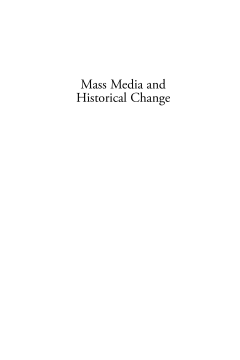
Additional Information
Book Details
Abstract
Media influenced politics, culture, and everyday life long before the invention of the Internet. This book shows how the advent of new media has changed societies in modern history, focusing not on the specifics of technology but rather on their distribution, use, and impact. Using Germany as an example for international trends, it compares the advent of printing in Europe and East Asia, and the impact of the press on revolutions, nation building, and wars in North America and Europe. The rise of tabloids and film is discussed as an international phenomenon, as the importance of media during National Socialism is looked at in comparison with Fascist Italy and Spain. Finally, this book offers a precise analysis of media during the Cold War, with divided Germany providing the central case study.
Frank Bösch is a Professor at the University of Potsdam and Director of the Center for Contemporary History. He is the author and editor of more than a dozen books on political, social, and media history, including Journalists as Political Actors: Transfers and Interactions Between Britain and Germany since the Late 19th Century (co-edited with Dominik Geppert, 2008) and Public History (co-edited with Constantin Goschler, 2009). He is also co-editor of the journal Zeithistorische Forschungen/Studies in Contemporary History.
“…readers will appreciate Bosch’s insights in comparing Nazi and GDR media, and underscoring common government interventions that emerged across fascist and democratic regimes, as well as his attempts to be inclusive with regard to Asian, African, and Latin America media formations. While the Internet age appears only in an epilogue, readers will profit from Bösch’s framing and breadth, and from his comprehensive bibliography and reviews of German sources and issues.” • Choice
“…he manages to provide a fascinating panorama of the emergence of new media over the course of more than seven centuries and their interaction with the social, cultural, and political conditions prevailing at different epochs. The book is not a “German media history” in the strict sense, but it does have strong comparative elements as well, offering a side glance on media developments in Europe, the United States, and Asia. Moreover, Bösch competently integrates the history of media evolution with societal interactions and ensuing social and political changes.” • H-German
“This is an excellent, wide-ranging, and expertly researched survey of the historical role of mass media in the Western world. It is original, concise, and well written, and provides a wealth of information that is not easily accessible elsewhere... [It] is held together by analytical questions on the role of mass media in mirroring and fostering cultural, social, economic, and political change... The breadth of the survey is admirable and so is its academic rigor.” • Christina von Hodenberg, Queen Mary University of London
Table of Contents
| Section Title | Page | Action | Price |
|---|---|---|---|
| Mass Media andHistorical Change | i | ||
| Mass Media and Historical Change - Germany in International Perspective, 1400 to the Present - Frank Bösch - Translated by Freya Buechter | iii | ||
| Contents | v | ||
| Introduction | 1 | ||
| Chapter 1 The Breakthrough of Typographic Printing | 13 | ||
| Chapter 2 The Establishment of Periodicals | 39 | ||
| Chapter 3 The Media and the Road to Modernity | 62 | ||
| Chapter 4 Modernity, World Wars and Dictatorships | 103 | ||
| Chapter 5 The Media during the Cold War | 137 | ||
| Epilogue The Internet Age from the Perspective of Media History | 167 | ||
| Bibliography | 175 | ||
| Index | 197 |
